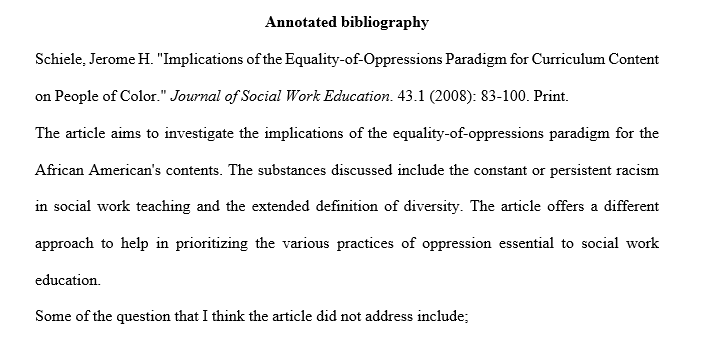Annotated Bibliography: IMPLICATIONS OF THE EQUALITY-OF-OPPRESSIONS PARADIGM FOR CURRICULUM CONTENT ON PEOPLE OF COLOR. By: Schiele, Jerome
Annotated Bibliography
IMPLICATIONS OF THE EQUALITY-OF-OPPRESSIONS PARADIGM FOR CURRICULUM CONTENT ON PEOPLE OF COLOR. By: Schiele, Jerome H. Journal of Social Work Education. Winter2007, Vol. 43 Issue 1, p83-100. 18p. Abstract: Because no distinction is made in the Council on Social Work Education’s educational standards about the frequency, intensity, or pervasiveness of the various forms of oppression, social work education affirms what may be called the equality-of-op pressions paradigm. This article contends that, although the equality-of-oppressions paradigm is a valuable perspective, its ascendancy in social work education may be placing the coverage of people-of-color content at risk of being diminished. This article examines two implications of the equality-of-oppressions paradigm for people-of-color content: (1) the expanded definition of diversity and (2) racism’s persistence in social work education. The article also offers a model of differential vulnerability to help prioritize the various forms of oppression important to social work education. [ABSTRACT FROM AUTHOR] DOI: 10.5175/JSWE.2007.200400478. (AN: 24494814)
IMPLICATIONS OF THE EQUALITY-OF-OPPRESSIONS PARADIGM FOR CURRICULUM CONTENT ON PEOPLE OF COLOR.
Authors:
Schiele, Jerome H.1 jschiele@moac.morgan.edu
Source:
Journal of Social Work Education. Winter2007, Vol. 43 Issue 1, p83-100. 18p.
Document Type:
Article
Subject Terms:
*SOCIAL work education
*CURRICULUM
*EDUCATIONAL standards
*ETHNICITY
*PEOPLE of color
*RACIAL differences
*RACISM
*PARADIGM (Linguistics)
NAICS/Industry Codes:
923110 Administration of Education Programs
624190 Other Individual and Family Services
Abstract:
Because no distinction is made in the Council on Social Work Education’s educational standards about the frequency, intensity, or pervasiveness of the various forms of oppression, social work education affirms what may be called the equality-of-op pressions paradigm. This article contends that, although the equality-of-oppressions paradigm is a valuable perspective, its ascendancy in social work education may be placing the coverage of people-of-color content at risk of being diminished. This article examines two implications of the equality-of-oppressions paradigm for people-of-color content: (1) the expanded definition of diversity and (2) racism’s persistence in social work education. The article also offers a model of differential vulnerability to help prioritize the various forms of oppression important to social work education. [ABSTRACT FROM AUTHOR]
Copyright of Journal of Social Work Education is the property of Routledge and its content may not be copied or emailed to multiple sites or posted to a listserv without the copyright holder’s express written permission. However, users may print, download, or email articles for individual use. This abstract may be abridged. No warranty is given about the accuracy of the copy. Users should refer to the original published version of the material for the full abstract. (Copyright applies to all Abstracts.)
Author Affiliations:
1Morgan State University
ISSN:
1043-7797
DOI:
10.5175/JSWE.2007.200400478
Answer preview for Annotated Bibliography: IMPLICATIONS OF THE EQUALITY-OF-OPPRESSIONS PARADIGM FOR CURRICULUM CONTENT ON PEOPLE OF COLOR. By: Schiele, Jerome

MLA
276 Words